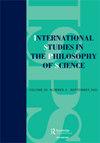Feyerabend and the Philosophy of Physics
IF 0.8
2区 哲学
Q2 HISTORY & PHILOSOPHY OF SCIENCE
International Studies in the Philosophy of Science
Pub Date : 2022-01-02
DOI:10.1080/02698595.2022.2193369
引用次数: 0
Abstract
In a reference letter for Feyerabend’s application to UC Berkeley, Carl Hempel writes that ‘Mr. Feyerabend combines a forceful and penetrating analytic mind with a remarkably thorough training and high competence in theoretical physics and mathematics’ (Collodel and Oberheim, unpublished, 80). Similarly, Rudolf Carnap says of Feyerabend that he ‘knows both the physics and the philosophy thoroughly, and he is particularly well versed in the fundamental logical and epistemological problems of physics’ (83). These remarks echo a sentiment widely accepted amongst Feyerabend’s colleagues that his knowledge of physics was at an extremely high level. Feyerabend’s acumen in physics goes back to his youth, when, at the age of 13, he was offered a position as an observer at the Swiss Institute for Solar Research after building his own telescope (Feyerabend 1995, 27). It is unsurprising, therefore, that physics played an important and long-lasting role in Feyerabend’s work. More specifically, Feyerabend’s early work contains several papers engaging with technical and general issues in physics, mostly quantum mechanics. Here, he provided analyses of Bohr’s complementarity and its relationship to positivism, von Neumann’s no-go proof, Bohm’s philosophy of physics, the measurement problem, the relationship between physics and philosophy, hidden-variable theories and theoretical pluralism, and the use of threevalued logic in quantum mechanics (to name just a few topics). These continued to play important roles in his work of the 1970s, although now they appeared alongside more historical examples, such as Galileo’s work on the rotation of the earth in Against Method. While scholarship on Feyerabend’s philosophy has been burgeoning, especially over the past 10 years or so, comparatively little research has delved into his work in the philosophy of physics. This special issue seeks to ameliorate that gap. The hope is to better understand Feyerabend’s philosophy of physics, its historical impact and reception, and discern what fruits Feyerabend’s philosophy of physics may still bear. This special issue comes in two parts. Here, we introduce only the first half, which contains four contributions, touching upon different aspects of Feyerabend’s philosophy of physics. It begins with Flavio Del Santo’s paper, ‘Beyond method: the diatribe between Feyerabend and Popper over the foundations of quantum mechanics.’ Here, Del Santo looks at the relationship between Feyerabend and his mentor and eventual philosophical enemy, Karl Popper with fresh eyes. Specifically, Del Santo provides a new explanation for the fracture between Feyerabend and Popper by looking at their recently published correspondence (Collodel and Oberheim 2020) and focusing on the personal nature of their relationship. Del Santo shows how Feyerabend’s growing ‘resentment’ toward his authoritarian father-figure and Popper’s growing frustration with Feyerabend centred on disagreements concerning quantum mechanics: how to interpret it, how to criticize it, and how to teach it. The juicy details in Del Santo’s paper range from funny to heart-breaking, and we are left to wonder whether ‘philosophy of science would have lost something without such a conflict.’ Matteo Collodel’s paper, ‘Ehrenhaft’s Experiments on Magnetic Monopoles: Reconsidering the Feyerabend-Ehrenhaft Connection,’ presents a newly discovered document from费耶拉本德与物理学哲学
在费耶阿本德申请加州大学伯克利分校的推荐信中,亨普尔(Carl Hempel)写道。费耶阿本德在理论物理和数学方面接受过非常全面的训练,并具有很强的分析能力”(Collodel和Oberheim,未发表,1980)。同样,鲁道夫·卡尔纳普评价费耶阿本德说他“对物理学和哲学都了如指掌,尤其精通物理学的基本逻辑和认识论问题”(83)。这些言论呼应了费耶阿本德的同事们普遍接受的观点,即他的物理知识处于极高的水平。费耶阿本德在物理学上的敏锐可以追溯到他年轻时,13岁时,他在建造了自己的望远镜后,被瑞士太阳研究所提供了一个观察员的职位(费耶阿本德1995,27)。因此,物理学在费耶阿本德的工作中发挥了重要而持久的作用也就不足为奇了。更具体地说,费耶阿本德的早期工作包括几篇涉及物理学技术和一般问题的论文,主要是量子力学。在这里,他分析了玻尔的互补性及其与实证主义的关系、冯·诺伊曼的“不去证明”、玻姆的物理哲学、测量问题、物理与哲学的关系、隐变量理论和理论多元主义,以及在量子力学中使用三值逻辑(仅举几个主题)。这些在他20世纪70年代的作品中继续扮演着重要的角色,尽管现在它们与更多的历史例子一起出现,比如伽利略在《反方法》中关于地球自转的研究。虽然关于费耶阿本德哲学的学术研究一直在蓬勃发展,尤其是在过去10年左右的时间里,但对他在物理学哲学方面的工作进行深入研究的研究相对较少。本期特刊试图缩小这一差距。希望能更好地理解费耶阿本德的物理哲学,它的历史影响和接受,并辨别费耶阿本德的物理哲学可能仍然有什么成果。本期特刊分为两部分。在这里,我们只介绍前半部分,其中包含四个贡献,涉及费耶阿本德物理哲学的不同方面。它从弗拉维奥·德尔桑托的论文《超越方法:费耶阿本德和波普尔在量子力学基础上的争论》开始。在这里,德尔·桑托以全新的视角审视了费耶阿本德和他的导师、最终的哲学敌人卡尔·波普尔之间的关系。具体来说,Del Santo通过查看他们最近发表的通信(Collodel and Oberheim 2020)并关注他们关系的个人性质,为Feyerabend和Popper之间的破裂提供了一个新的解释。德尔桑托展示了费耶阿本德对他的专制父亲形象日益增长的“怨恨”,以及波普尔对费耶阿本德日益增长的失望,这些都集中在关于量子力学的分歧上:如何解释它,如何批评它,以及如何教授它。德尔桑托的论文中有很多有趣的细节,从有趣到令人心碎,我们不禁要问,如果没有这样的冲突,科学哲学是否会失去一些东西。Matteo Collodel的论文,“Ehrenhaft的磁单极子实验:重新考虑feyerabendehrenhaft连接”,展示了一份新发现的文件,来自
本文章由计算机程序翻译,如有差异,请以英文原文为准。
求助全文
约1分钟内获得全文
求助全文
来源期刊

International Studies in the Philosophy of Science
HISTORY & PHILOSOPHY OF SCIENCE-
自引率
12.50%
发文量
10
期刊介绍:
International Studies in the Philosophy of Science is a scholarly journal dedicated to publishing original research in philosophy of science and in philosophically informed history and sociology of science. Its scope includes the foundations and methodology of the natural, social, and human sciences, philosophical implications of particular scientific theories, and broader philosophical reflection on science. The editors invite contributions not only from philosophers, historians, and sociologists of science, but also from researchers in the sciences. The journal publishes articles from a wide variety of countries and philosophical traditions.
 求助内容:
求助内容: 应助结果提醒方式:
应助结果提醒方式:


